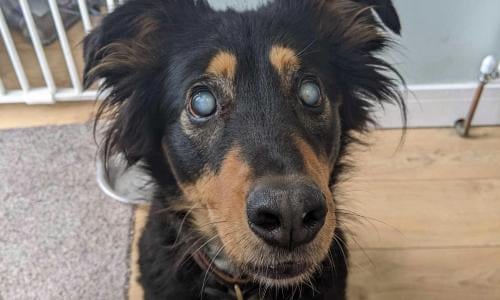Last Updated on July 22, 2024 by Dog Lover
A groundbreaking genetic test inspired by a courageous rescue dog could pave the way for eliminating a debilitating inherited blindness in dogs. Shola, an English shepherd whose eyesight deteriorated due to progressive retinal atrophy (PRA), has been pivotal in a scientific advancement that holds promise for dog breeders worldwide.
PRA, a condition affecting over 100 dog breeds, leads to the progressive loss of light-sensitive cells in the retina, ultimately resulting in blindness. Traditionally, there has been no effective treatment, and some dogs only show symptoms years after passing their genes to the next generation.
Katherine Stanbury from the University of Cambridge, the lead researcher on the project, shared that Shola began to lose her vision at the age of four. “Shola was diagnosed with PRA by a veterinary ophthalmologist, and we later discovered that her brother was also affected,” said Stanbury.
The research team not only pinpointed the genetic variant responsible for PRA in English shepherds but also developed a £48 DNA test to determine if a dog carries one or two copies of the variant. This advancement is expected to significantly impact breeding practices, as it allows breeders to identify and avoid using dogs that could pass on the condition.

Stanbury explained that while PRA-causing variants are usually breed-specific, the new test will be applied to other breeds with inherited eye conditions. “If we find the variant in other breeds, we can monitor and address it accordingly,” she added.
The discovery began when Shola and her brother were brought to the attention of the research team by a concerned breeder. Through whole genome sequencing and analysis, the researchers identified a novel genetic variant responsible for PRA in these dogs.
The hope is that this test will help prevent the propagation of PRA by enabling early identification of affected dogs, thereby potentially eradicating the condition from the breed. “Breeding from a carrier is possible if paired with a clear dog, which is crucial for maintaining genetic diversity within the breed,” Stanbury noted.
Shola’s legacy continues through her offspring, with two of her daughters completing mountain rescue training and one son serving as a therapy dog. “The owners of these dogs can be confident that none will face blindness, ensuring their valuable training is not in vain,” Stanbury said.
This advancement represents a significant step forward in veterinary genetics and offers a promising future for reducing hereditary blindness in dogs.
Read the full story on The Guardian here.
Source: The Guardian























